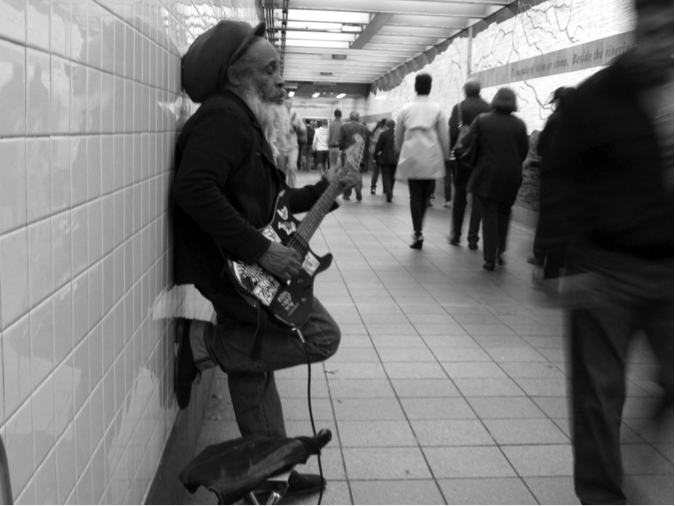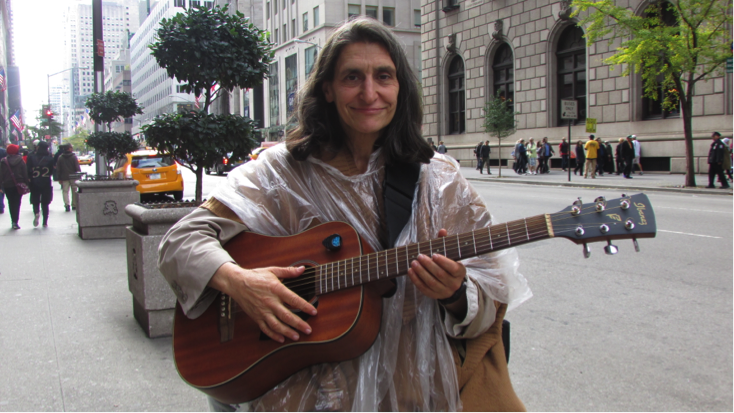One of the reasons why I was so appalled at my action during the trip to Ho Chi Minh City is that, I used to make a different choice. Upon my conflicted state of seeing a homeless man or a stranger seeking for financial help, I would force myself to step out of my comfort zone and talk. By conversing with them, I let them know that they were not invisible.
Of course, making this choice was tough at first, but rewarding in the end. The conversations I had with people who I would have otherwise ignored, stay with me: depressing because of unexpected horrors, but endearing thanks to lovely tidbits of information we strangers can share.
I used to pass a homeless man standing in front of Penn Station every day last summer. I remembered how his bulky figure was hard to miss on the crowded sidewalk, the white frizzy hair that glistened under summer sunlight, the cheeks covered with gray freckles and his fingers with dirty nails holding the sign, “Homeless. Any help is appreciated.”
“Hi, would you like some chicken nuggets?” I said.
His lips spread into a thin smile as I shared with him my lunch. The short conversation initiated by my fragile courage led me to his world. Losing his job, he quickly became homeless, relied on random kindness from strangers for food and slept at a park near the station. When we parted, he overwhelmed me with ferocious appreciation.
“Thank you so much,” he repeated incessantly.
But, he wasn’t the only one. The story of each homeless person is very different. I recalled another one whose divorce took everything away from him. He had a long face, high cheekbones, and a seemingly wistful expression. When I started talking to him, he shared much, as if he had always wanted someone to listen and care.
“Even though I haven’t showered since Christmas, I would rather live on the streets than go back to the homeless shelter. It is safer,” he told me as I conversed with him. “When you throw all the people with these mental problems into one confined space, there will be many issues. My stuff, my Bible, they took them away.” At the end, I wished him luck but received no answer.
My heart sank as I realized he had resumed staring into the nothingness. I stood up and turned around to join the flow of oblivious pedestrians, feeling unsettled. I needlessly worried that I would soon forget about this man and his situation. After all, how long could I remember an acquaintance I almost ignored? But I didn’t, I don’t, I can’t and I won’t, forget.
When you really care and seek to know another being, it’s harder to ignore their dignity. No longer nameless, they are human beings, with identities, stories, struggles, feelings, dreams and hope. They deserve to be listened to, helped, respected and loved; treated as subjects, not objects, just like you. And me.
However, it is still one thing to understand such a truth, and another to live it. To live this way, takes heart, an open mindset and constant courage to make seeing dignity a reality of habit.
There are days when I don’t want to pay attention; there are days, I find it unnecessarily stressful to try to understand someone. Sometimes, like what happened in Ho Chi Minh, my tendency to overthink stops me. And, tired of grappling with this freedom to choose the good for another, I choose to ignore.
Our culture of social and professional climbing pressures many of us to believe that we cannot afford to live slowly. More often than not, I fail to fully engage in a conversation, reply to my friends’ messages or pause to think deeply for another person. And yet, I should never forget that I have the choice. I can reach out or stay silent, I can think of others or of myself, I can engage wholeheartedly or disengage and detach from my connection to others and to the world.
I am thankful for the internship at World Youth Alliance, because when it seems too easy to get carried away with the fast pace of life, my work and the WYA readings, known as the Certified Training Program, slow me down and remind me: human dignity matters. Our inner struggle is a hopeful sign of humanity and the necessary burden of what it means to be a caring human being.
Written by a current WYA North America intern, Nhi Tong from St John’s University.









